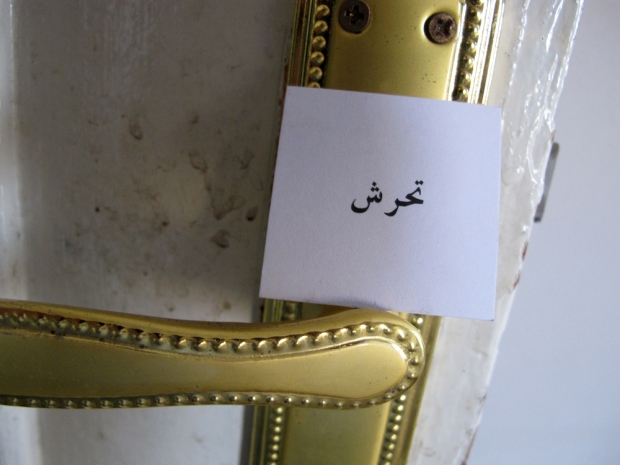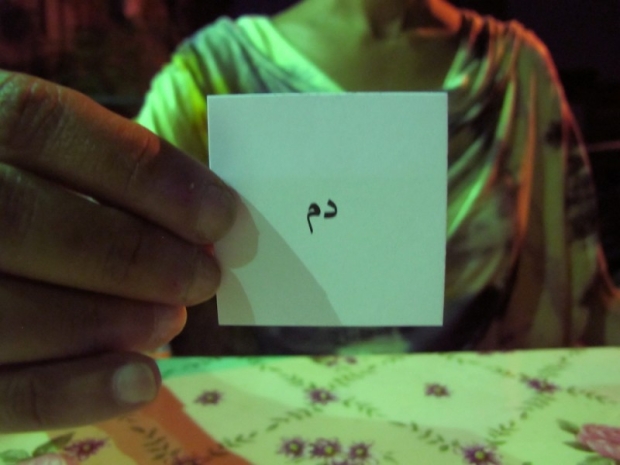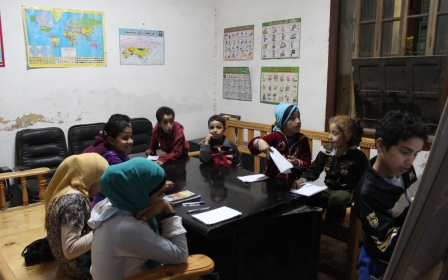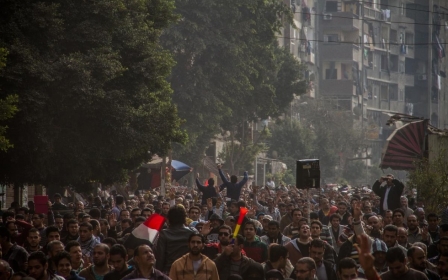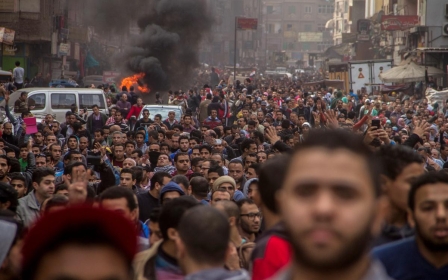Crafting a dictionary of Egypt's revolution
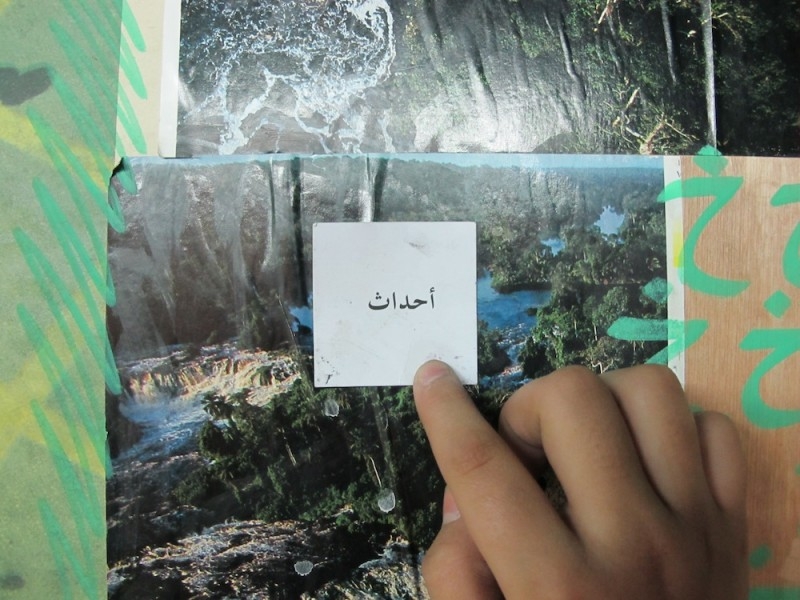
Words powered Egypt’s 2011 uprising. Millions took to the streets demanding the fall of the regime, as well as the more romantic “bread, freedom and social justice”. These chants took on new meanings as a post-revolution government was formed, deposed and replaced. For many, they have become synonymous with the upheaval of the revolution.
But at risk of being forgotten is a host of other words and phrases - some banal, some surprising and some downright bizarre - that exploded into the public consciousness four years ago.
“Just after the revolution of 25 January 2011, I started to hear conversations that would never have happened in public space before,” said Amira Hanafi, an Egyptian artist and modern-day lexicographer who is compiling a “Dictionary of the Revolution”.
“I wanted to document that phenomenon, and I chose to do that by looking to the language itself,” Hanafi told Middle East Eye by phone from Cairo, where she spends hours every day listening to recordings of everyday Egyptians from up and down the country.
The project is enormous. Hanafi sat with hundreds of Egyptians, placing in front of them a box filled with 160 white cards. On each was printed one of the words and phrases that resonated with people during the revolution and after it. Obvious candidates were included, like “oppression”, “day of rage” and “blood”. But more offbeat phrases also made the cut: “Nesto cheese” for the hated brand of cheap cheese often distributed by government institutions before the revolution, “Kentucky” after rumours circulated that various revolutionary groups were giving out free fried chicken to encourage people to join the demonstrations, and “Guy Fawkes mask” for the ominous disguises donned by revolutionaries.
“I wanted it to feel a little like a game,” said Hanafi, who first dreamed up the project over two years ago. “People would open the box and go through the cards, and I would ask them to pick words they felt connected to. I asked them to define each word and talk about how its meaning had changed – what it meant before the revolution and what it means now.”
Travelling around the country, the cards elicited hugely different responses - a reflection, Hanafi said, of the different experiences of the revolution across Egypt. “People often talk as if the revolution was just in Tahrir Square [in Cairo]. So it was very important for us to travel around to different governorates. We went mainly to cities and slums."
Hanafi also travelled to South Sinai, Egypt’s least populated governorate and far removed from the political wrangling in Cairo. “The responses were very different there. People were very removed from events in the rest of Egypt, and much more focused on their own problems. They felt very unserved.”
Hanafi discovered a diversity of opinions everywhere she looked, even in the terms that might seem uncontroversial. “‘Thawra’ [revolution] is one of the more popular words in the dictionary,” said Hanafi. “I would ask people how the word’s meaning had changed before the revolution and after it, and they would say, 'Which revolution? The one in 2011 or June 30?' That was a very important question when talking about the revolution: has it even happened? What’s your definition of revolution and has one happened here? Opinions on that were extremely diverse."
Hanafi wanted to record people’s feelings about her chosen words in the local Arabic dialect, aamiya, rather than the formal media language known as fusha. “We wanted to document public speech – and nobody speaks fusha in the streets,” she told MEE. “As soon as someone gets emotional and feels connected to what they’re saying, they start talking in aamiya. So people would sometimes start out speaking fusha, but within five minutes they would be using aamiya.”
Now, after eight months spent collecting the anonymous recordings, Hanafi is sifting through the vast amount of material and turning it into a book. An accompanying website aims to keep the dialogue going, as the turmoil in Egypt continues to make a mark on the memory of the 2011 revolution.
“Before the revolution there was a lot of fear and censorship, a constant security presence in the streets. Then the uprising happened and things just exploded open. At that time, it felt like every non-Egyptian in Egypt was making a documentary film. There is far less of that now – but I still feel there is great value in documenting events from afar. You can sit back and reflect on what has happened over a longer period of time.”
“Key words are used in manipulative ways by the media,” Hanafi said of the linguistic battleground that has emerged since the revolution. The word revolution itself has become contested territory - supporters of the 30 June 2013 overthrow of former President Mohammed Morsi hailed it as a popular revolution, while opponents dubbed it a coup.
“I want us to be able to look back and remember the specifics, not just how the media has chosen to speak about it."
“I called the project a dictionary, but at the end of the day, it is really about asking people to repossess the language and to define it for themselves.”
Taharrush - harassment
“People are always surprised to hear that a lot of people chose to speak about this word - it was definitely not just women," said Hanafi of this entry. "At the time when I was doing the interviews, it was a very present issue in the consciousness of people’s lives."
Sexual harassment became a touchstone issue during and after the 2011 uprising – women and men took to the streets to demand an end to what they said was a prevalent culture of intimidation.
Dictionary entries
- “Harassment … that’s one of the things that the revolution must change. Harassment has been around for a long, long time. Women will be walking in the street and boys harass them. It’s increasing at the moment, maybe because people walking around feel like they can do anything. It goes along with the chaos that we’re living in. The solution isn’t to put a soldier behind each person in the street and see what he’s up to. Or that women shouldn’t go down to the streets, or that they wear hijab or niqab so they don’t get harassed. No.”
- “The first time I was harassed I was in secondary school, walking to our house. Actually it could’ve been when I was in primary school. I went to the police and said: 'Someone touched me – I don’t know who!' I sat crying all day. After that I became afraid to walk in the street. Very afraid. The street became a terrifying thing to me.”
Damm - blood
- “I don’t like blood at all. Even bird or animal blood. When the time of the revolution came, and after the revolution, there was really a lot of blood. I saw that blood was not just for animals – it was for people too. I saw it on the TV and here in the country. The situation changed … People injured, wounded, dead. I really hated seeing that.”
Intikhabat – elections
- “The elections before the revolution are the same as those after it. A process for rigging people’s votes. They bring someone to rule who the people don’t want. And those [elections] that happened before the revolution and those after it are one and the same. That Egyptians interact with elections all the time is really weird ...
- "I mean, before the revolution I never used to participate in anything like this … I never took part in elections at all. Not for the cabinet or the president or anything. As we used to say, the process could run on its own. There was no need to go down and vote – we knew the result before it started … After the revolution, to be honest, I began to have more awareness. Everyone in my house started to go out and vote. This word [elections] didn’t used to have any importance for me before the revolution. I wasn’t interested.”
New MEE newsletter: Jerusalem Dispatch
Sign up to get the latest insights and analysis on Israel-Palestine, alongside Turkey Unpacked and other MEE newsletters
Middle East Eye delivers independent and unrivalled coverage and analysis of the Middle East, North Africa and beyond. To learn more about republishing this content and the associated fees, please fill out this form. More about MEE can be found here.



